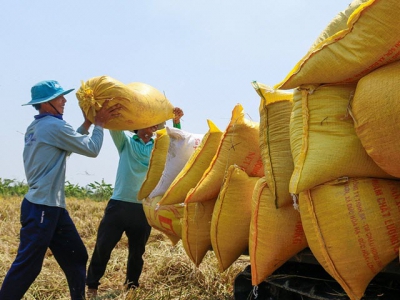Agro-forestry-fishery exports record trade surplus

Vietnam’s Ministry of Agriculture and Rural Development (MARD) is reporting a surplus of US$6.2 billion in agro-forestry-fishery trade in the first eight months of 2020, 4.9 percent higher than the same period last year.
Rice, forestry highlights
In the first eight months of this year, agro-forestry-fishery exports totaled US$26.15 billion, representing a year on year drop of 0.9 percent, according to the ministry report. Export revenue of major agricultural products was estimated at nearly US$12 billion, down 3.2 percent; husbandry at US$250 million, down 25 percent; seafood products at US$5.2 billion, down 5.3 percent; and major forest products at more than US$7.8 billion, up 10.3 percent.
During the same period, the country imported farming products worth US$19.9 billion, a 2.5 percent drop, with import value of major agro-forestry-fishery products estimated at US$16 billion, a decrease of 5.2 percent.
Despite the Covid-19 impact, export businesses promoted agricultural sales to key markets, resulting in a trade surplus of about US$6.2 billion, an increase of 4.9 percent year on year.
Rice was one of the agricultural export highlights during the period. Nguyen Quoc Toan, Director of the MARD's Agro Processing and Market Development Department said that despite the decreased export volume, rice export value in this period reached US$2.2 billion, a year on year increase of 10.4 percent thanks to high export prices, averaging US$488 per tonne.
In late August 2020, the Trung An Hi-Tech Agriculture Joint Stock Company (Can Tho Province) exported the first batch of fragrant rice to the EU since the entry into effect of the EU-Vietnam Free Trade Agreement (EVFTA) on Aug 1. General Director Pham Thai Binh said the company exported about 150 tonnes of rice under an export contract of 3,000 tonnes of two varieties of fragrant rice, ST20 priced at US$1,000 per tonne and Jasmine rice at US$600 per tonne. The deal proves that high quality Vietnamese rice can enter the high-end market at higher value, especially under the preferential zero percent taxes stipulated by the EVFTA.
Meanwhile, the export of forest products reached US$7.3 billion during the January-August period, up 9.3 percent over the same period last year. According to the Ministry of Industry and Trade, the main factor driving the export of Vietnamese wooden products over the past two months was virtually uninterrupted production, unlike the situation in other major producers such as China, Germany and Italy.
The escalation of US-China trade tensions has diverted US importers to other markets, including Vietnam. In addition, promoting online marketing activities also drew attention to Vietnamese firms.
Other commodities such as vegetables, cassava, and shrimp also performed well in the first eight months of the year with vegetables export revenue reaching US$487 million, a year on year increase of 12.8 percent; cassava at US$108 million, up nearly 95 percent; and shrimp at nearly US$2.4 billion, up 11.4 percent.
The US was the largest export market of Vietnamese agro-forestry-fishery products with a revenue of more than US$6.3 billion for the period, up 14.2 percent, accounting for 24.13 percent of the export market share. China came second with revenue of US$6.28 billion, a drop of 10.1 percent, accounting for 24 percent of market share. Agro-forestry-fishery exports to other major markets also saw decreases – falling 2.2 percent in the EU market to US$2.5 billion, 11.4 percent in the ASEAN market to US$2.24 billion, and 1.8 percent to Japan at US$2.2 billion.
Monitoring supply, demand developments
In order to ease difficulties and support export activities, the government, ministries and sectors have warned of new regulations adopted in export markets, especially China so that enterprises could adjust their production and business, limiting pressure on domestic consumption when exports encounter difficulty.
In addition, functional agencies are focusing on overcoming technical barriers, negotiating to expand markets to countries like China, the EU, the Eurasian Economic Union, the US and Brazil and map out working plans in China, Brazil, the Russian Federation, Japan, and Australia to prepare for the post Covid-19 recovery.
The MARD said it would continue to monitor and regularly report price fluctuations, supply and demand of essential agricultural products (pork, rice, vegetables and fruits) in key markets affected by the epidemic, and closely monitor the export of agricultural products through the border gates with China.
Regarding aquaculture, it will continue to raise key species (tiger shrimp, white-legged shrimp, and Tra fish) and other high economic value species to increase commercial value and sustainable development.
It will also implement effectively the EU recommendations for removing the "yellow card" issued for Vietnam towards a sustainable development of the fishery sector. Regarding forestry, the MARD will direct measures to restore production, processing and export of forestry products.
Có thể bạn quan tâm
Phần mềm

Phối trộn thức ăn chăn nuôi

Pha dung dịch thủy canh

Định mức cho tôm ăn

Phối trộn phân bón NPK

Xác định tỷ lệ tôm sống

Chuyển đổi đơn vị phân bón

Xác định công suất sục khí

Chuyển đổi đơn vị tôm

Tính diện tích nhà kính

Tính thể tích ao hồ



 Java olive trees offer Ninh Thuận farmers high…
Java olive trees offer Ninh Thuận farmers high…  Thai jackfruit price increases sharply in Mekong Delta
Thai jackfruit price increases sharply in Mekong Delta